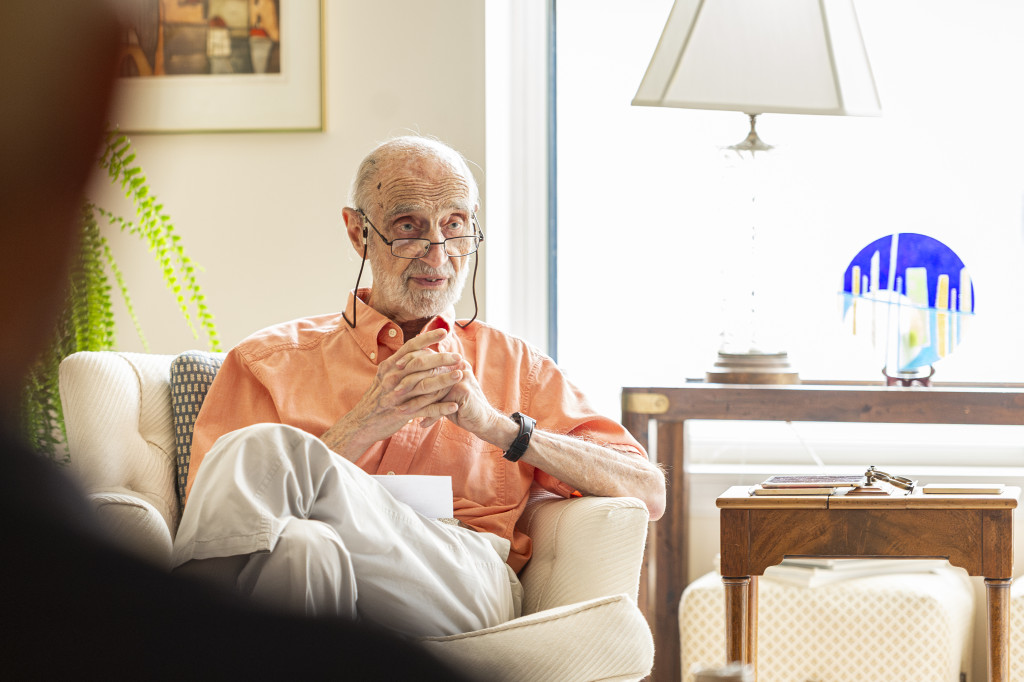Political scientist and former UW–Madison Chancellor Bernard Cohen dies at 97

Former UW–Madison Chancellor Bernard Cohen at his downtown Madison home on July 10, 2018. Cohen, who died Jan. 9, 2024, at the age of 97, remarked in 2018 about his long career at UW–Madison, “I enjoyed my career because it was a mix. I was always doing something different, either as a political scientist or as an administrator.” Photo: Bryce Richter
Bernard Cecil Cohen, a prominent political scientist and influential author who spent 30 years at the University of Wisconsin–Madison in a variety of academic and administrative roles, including one year as acting chancellor, died Jan. 9, 2024, in Madison after a brief decline in health. He was 97 and the university’s oldest living chancellor.
Cohen served as acting chancellor in 1987 between the administrations of Irving Shain and Donna Shalala.
“Professor Cohen was a highly regarded political scientist of national prominence who served with distinction in many roles at UW–Madison, including acting chancellor,” says Chancellor Jennifer L. Mnookin. “At a lunch we spent together, I especially appreciated his warmth and wisdom. He was full of great stories about UW–Madison, an institution that benefitted so much from his scholarship and leadership.”
Cohen joined the UW–Madison faculty in 1959 and led the Department of Political Science as its chairman from 1966-69. He served as associate dean of the Graduate School from 1971-75 and as vice chancellor for academic affairs from 1984-86. He was appointed acting chancellor on Jan. 1, 1987, following Shain’s retirement.
His best-known book, “The Press and Foreign Policy,” published in 1963, is considered a classic in the analysis of media and foreign policy. It broke ground in detailing the ways that Washington correspondents at major news-gathering operations helped set the agenda for U.S. foreign policy. One of his conclusions, as reported at the time by the American Journal of Sociology, was that “by no clear criteria, a small group of journalists who specialize in foreign affairs determines what becomes news and what goes unreported, thus deciding for policy-maker and public alike the major foreign policy issues of the day.”
“Professor Cohen’s work on the agenda-setting power of the media in foreign policy is still important and relevant today,” says Jon Pevehouse, Mary Herman Rubinstein Chair of Political Science and Public Policy and chair of the UW–Madison Department of Political Science. “His work also suggested an important role for the public in shaping and constraining foreign policy in democracies — a position that was at odds with the received wisdom at the time. His scholarship is still found on course syllabi and has been cited thousands of times. His academic legacy will live on for decades.”
During his time as chancellor, Cohen considered himself primarily a loyal caretaker. “My instructions were to make sure the ship didn’t hit a big rock,” he said in a 2018 interview.
No major disasters struck, but Cohen’s tenure was not without steep challenges. In May of 1987, a racist incident rocked campus, becoming national news. The UW–Madison chapter of the Phi Gamma Delta fraternity held its annual “Fiji Island” party. Some guests wore blackface, and a 15-foot cutout caricature of a Black man with exaggerated lips and a bone through his nose greeted partygoers. Cohen led efforts to address the ensuing outrage (the fraternity was temporarily suspended) and to improve race relations on campus.
Cohen’s tenure saw the continued growth of the Chancellor’s Scholarship Program, an initiative designed to attract talented students from groups that historically had been underrepresented in higher education. Cohen strengthened donor relations and launched a fundraising effort that endowed the Irving Shain Chancellor’s Scholarship.
Cohen chose not to seek the chancellorship permanently. After Shalala’s hiring, he returned to the position of vice chancellor for academic affairs. He retired from the university in 1989.
Born on Feb. 22, 1926, in Northampton, Massachusetts, Cohen received his bachelor’s degree (1948), master’s degree (1950) and doctorate (1952) in international relations, all from Yale University. He taught at Princeton University from 1951 to 1959 before joining the faculty of UW–Madison. He authored four books and edited a fifth. His last book, published in 1995, was “Democracies and Foreign Policy,” which offered a detailed comparison of the patterns of public participation in foreign policy in the U.S. and the Netherlands.
“I enjoyed my career because it was a mix,” Cohen said in 2018. “I was always doing something different, either as a political scientist or as an administrator.”
Survivors include his wife of 77 years, Laura (Toby) Cohen; daughters Barbara Cohen (Shmuel Inbar) and Janie Cohen (Larry Crist); grandchildren Sara Christopherson (Jonny Hunter), Talia Inbar, Yaniv Inbar (Petra) and Yaara Inbar (Neer Roggel); and five great-grandchildren.
Tags: leadership, obituaries




